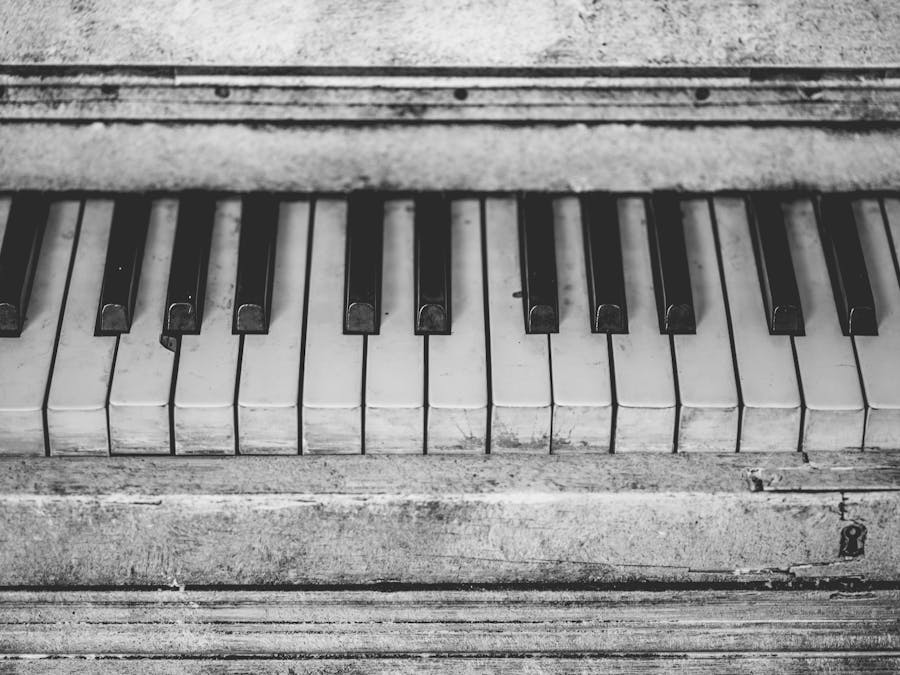 Piano Guidance
Piano Guidance
 Piano Guidance
Piano Guidance

 Photo: Charlotte May
Photo: Charlotte May
Modern standard copyright for creative works and intellectual property, including musical compositions, song recordings, and songs, means that the author retains property rights for their entire life, plus 70 years after their death.

There is not a distinct answer to who has the highest IQ, but it is not Albert Einstein. Those with higher IQs in comparison with Einstein include...
Read More »
Quality acoustic pianos have a resonance, warmth, and space to them that simply cannot be recreated by any digital means. While there's nothing...
Read More »Public domain music is often older recordings. As of January 2022, music from 1926 and earlier is available in the public domain. However, some details of copyright law mean that later compositions can be accessed in the public domain, as they did not adhere to changes in federal laws. Music published under a Creative Commons license, which is a recent online form of legal protection allowing access to users for free, can also be used in certain circumstances. Public domain essentially covers creative works that are no longer protected by intellectual property laws. What Is Public Domain Music? Public domain music covers several types of compositions and musical recordings in which the claim to intellectual property has either expired, been forfeited, or been waived. Most people recognize the term public domain in reference to published works, including sheet music or musical recordings, which once were protected by copyright, but the copyright expired several decades after the artist’s death or a considerable length of time after the work’s creation. However, newer types of public domain artworks like Creative Commons licensing have increased access to music for producers and business owners. Once copyright expires on a work like a recorded song, you can use it for any purpose without paying the publisher, the artist, or another institution. This may not be true of every version of the song. For example, if an artist records a new arrangement of a piece of public domain music, that specific recording may be considered intellectual property. However, the original song remains in the public domain. Copyright Law in the United States In the United States, copyright laws protect intellectual property for artists, producers, and publishers, so they can receive fair compensation for their labor. These laws have been updated several times to prevent copying of sheet music without attribution or payment, to prevent illegal recordings of recorded songs from being distributed for financial gain, and to prevent public streaming of recorded music in ways that might benefit a business without payment to the artist. Musical authorship copyright laws cover the publication of these: Sheet music

Tsutsumi practices a traditional dance form known as nihon buyo (Japanese classical dance). Dating back to the early 17th century, the tradition of...
Read More »
MuseScore has an intuitive layout which is great if you're new to music notation software. With visible sidebars and all the standard music and...
Read More »Transferring ownership, leasing or lending temporary ownership, or renting a copy of the work Distributing the digital recording of the musical composition through any transmission method they choose There are some types of intellectual property that cannot be copyrighted, including these: Ideas or concepts

Ideally, a piano player should play piano on a bare floor—not on a rug or carpet (unless they live in an apartment building and need to dampen the...
Read More »
Jazz theory refers to a particular area of music theory that relates to the chord progression, scales, melodies, and rhythms primarily used in jazz...
Read More »These are protected for 110 years after their initial publication. Recordings from 1957 to February 14, 1972: These will enter the public domain on February 15th, 2067. These will enter the public domain on February 15th, 2067. Recordings 1972 to 1978: Published with notice, these are protected for 95 years after publication. Without notice, these works are considered public domain. Published with notice, these are protected for 95 years after publication. Without notice, these works are considered public domain. Recordings 1978 to 1989: With notice, standard copyright of 70 years after the author’s death or 120 years after publication applies. Without notice, these works are considered in the public domain. With notice, standard copyright of 70 years after the author’s death or 120 years after publication applies. Without notice, these works are considered in the public domain. After 1989: These works are protected by copyright law and must wait until the expiration date of copyright to be incorporated into the public domain.

The septet's name, BTS, stands for the Korean phrase Bangtan Sonyeondan (Korean: 방탄소년단; Hanja: 防彈少年團), which translates literally to "Bulletproof...
Read More »
The full version of Fur Elise is considered reasonably difficult, broadly an intermediate piece around grade 5, but a shorter arrangement of only...
Read More »
Any student is able to learn to play piano by ear, all it takes is a lot of practice and several different exercises and techniques to train your...
Read More »
And if you don't understand it, shoot, any musician will tell you: Jazz takes a lifetime to learn. It's really hard! Jazz, as a whole, requires a...
Read More »